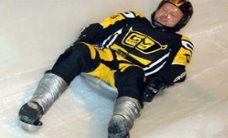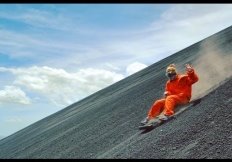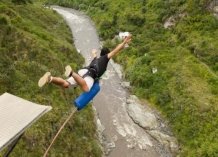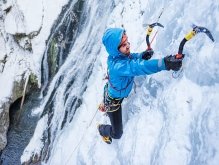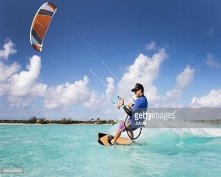Урок на тему:"Extreme outdoor activities. Zero and first conditioanls"
Конспект уроку англійської мови для 10 класу
Урок допоможе учням удосконалити свої вміння та навички у всіх видах мовленнєвої діяльності, розширити свій кругозір, збагатити свій словарний запас, проявити свої творчі здібності. Цей матеріал стане у нагоді усім вчителям англійської мови.
Theme: “Extreme outdoor activities. Zero and first conditionals”
Form: 10
Котова О.І., Київська інженерна гімназія
Objectives: By the end of the lesson students will be able to use zero and first conditionals while talking about extreme outdoor activities
Equipment: computer, texts, CD player, blackboard, student’s book ‘Prime time 3’ Express Publishing.
Procedure
I Introduction
Hello, dear friends. The theme of our lesson is “Extreme outdoor activities”. I am sure this topic will be especially interesting for you as you are really fond of extreme outdoors.
II Warming up
Would you mind answering the following questions?
What extreme activities do you now?
Task 1 .Look at the pictures and tell me please what equipment do you need to do this activity.
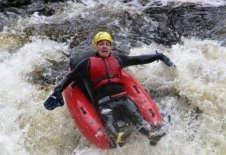
B.
H. 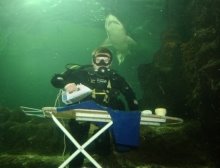
Suggested Answer key:
Picture A is wok racing. You need a Chinese frying pen, a helmet and ladles to go in for it. Picture B is river bugging. You need an inflatable armchair and flippers to go river bugging. Picture C is volcano surfing. To do this sport you need a board and protective clothing. Picture D is quad racing. To do this sport you need a four –wheeled motorbike and a helmet. Picture E is bungee jumping. You need an elastic rope to go in for it. Picture F is ice climbing. You need an ice axe and boots with metal spikes to go ice climbing. Picture G is kite surfing. You need a surfboard connected to a kite to go kite surfing. Picture H is extreme ironing. You need an iron board and an iron to do extreme ironing.
III Main part
Task 2 Reading
- Look at the text. What do you know about these three activities? How can you go faster when doing each one? Read and find out.
Text Extremely weird
Volcano Surfing
If you want to try this craze, you’ll have 1)......to Nicaragua’s Cerro Negro volcano. When this active volcano erupts, it throws out ash that’s perfect ….. 2) surfing on. Hike for 45 minutes to the top of the mountain, walk around inside the smoking volcano, then put on some protective clothing and fly down the slope at 50 kmph. If you sit down on a board, you’ll go even faster.
Wok racing
Imagine speeding down an icy track at 60 kmph in a Chinese frying pan. Wok racing started as a joke on Germany TV, but it soon became very popular and now 3)……. is a world championship every year. For protection, competitors wear special suit and helmet and they also put ladles on their feet. So how do you 4)…….? Well, here’s a hot tip- if you warm the bottom of your wok before competing, it melts the ice and you go faster.
River Bugging
You can sit in it, but you won’t get any rest in this inflatable armchair. A river bug speeds you along a river and down rapids. If you 5)…….to control it well, you’ll need webbed gloves and short flippers. Go backwards to go faster. The only problem is that you can’t see 6)……is coming if you go backwards. Watch out for the rock!
- Read the text and for each gap(1-6) choose the word that best fits.
- a) to travelling b) to travel c) travel d) travelling
- a) in b) with c) at d) for
- a) it b) that c) their d) there
- a) win b) beat c) come d) earn
- a) see b) think c) feel d) want
- a) what b) that c) there d) it
Suggested answer key
- In volcano surfing, you use a board to surf down the side of a volcano. To go faster you have to sit down on your board.
In wok racing you speed down an icy track in a wok with ladles on your feet. To go faster, you warm the bottom of your wok before you start.
In river bugging, you use an inflatable armchair, webbed gloves and flippers to speed along a river. To go faster, you go backwards.
- 1) b 2) 3) d 4) a 5)d 6)a
- Check the words in bold in the text and explain/elicit the meaning of the words or ask students to use their dictionaries and look them up
Weird (adj): strange
Craze (n): a popular activity
Erupt(v): (of a volcano) to throw out rocks and lava
Ash (n): powder that is left after sth has burnt
Protective(adj): protecting you from harm
Slope(n): side of the hill
Speed(v): to move fast
Word championship (n): competition that is open to people around the world
Compepitor(n): person who enters a race or competition
Tip(n): hint
Bottom(n): the lowest part of sth
Compete(v): to take part in a competition
Melt(v): to change to liquid form because of heat
Rest (n): relaxation
Rapids(n): fast flowing part of river
Control(v): to direct the action of smth
Webbed gloves(n): gloves that have the fingers joined together with material
Backwards (adv): in reverse
Task 3. Consolidation of new vocabulary
- Fill in : slopes, compete, clothing, track, melt, control, erupt, rapids.
- When did the volcano last ……?
- Never go volcano surfing without wearing protective…..
- The …. of the mountain are very steep.
- He went down the icy ….at 80 kmph
- Ten teams of the ten people each will…… in the tournament
- They spread salt on the road to….. the ice
- The river offers beautiful scenery and challenging…… to those who seek adventure
- They tried to …. their canoe, but it tipped over and they fell into the water.
- Match the words in bold with their meaning: in reverse, explodes, goes fast , look out for, wear, fad, participants
Answer key
a)1) erupt 2) clothing 3) slopes 4) track 5) compete 6) melt
7) rapids 8) control
b) Craze: fad
erupts: explodes
put on: wear
competitors: participants
speeds: goes fast
backwards: in reverse
watch out for: look out for
Grammar
Conditional types 0, 1
Task 4. Read the examples. How do we form conditional types 0,1?
- If/when ice gets hot, it melts(Type 0)
- If we visit Nicaragua, we’ll go surfing (Type1)
- If you like extreme sports, try quad racing (Type1)
- Unless I train, I’ll lose the game(=if I don’t) ( Type1)
Explanation of the grammar
We use type 0 conditional to talk about a fact of nature or a general truth. We form type 0 conditional with a when/if clause and a main clause. We always use the present simple tense in type 0 conditional.
We use type 1 conditional to talk about things that are likely to happen in the future. We form type 1 conditional with an if-clause and a main clause. We always use the present simple tense in the if-clause and the future simple tense/an imperative/can, may, should+base form of the verb in the main clause.
Practice type 0 conditional
Task 5. Write conditional type 0 sentences using the phrases.
- you/fall/into a river(you/get wet)
If you fall into a river, you get wet.
- you/do river bugging backwards(you/go faster)
- i/exercise(I feel better)
- you/put an inflatable object in water(it/float)
- you/heat water(it/boil)
- we/go out on hot day without sunscreen(we/get sunburnt)
Answer key
- If you do river bugging backwards, you go faster.
- If / When I exercise, I feel better.
- If you put an inflatable object in water, it boils.
- If/When you heat water , it boils.
- If we go out on a hot day without sunscreen, we get sunburnt.
Practice type 1 conditional
Task 6. Complete the conditional type 1 sentences with the correct form of the verbs in brackets.
- If you…..(not/wear)protective clothing when wok racing,you….(get)hurt.
- Unless you…( like) getting wet, you…..(not/enjoy) river bugging.
- You …..(have) better control of your river bug if you…. (use) webbed gloves and flippers.
- Unless you…..(wear) boots with spikes, you…..(not/be able)to go ice climbing.
- He…….(should/not/try) river bugging unless he ….(know) how to swim.
Answer key
- don’t wear, will get
- like, won’t enjoy
- will have, use
- wear, won’t be able
- shouldn’t try, knows
Practice 0 and 1 conditionals
Task 7. Put the verbs in brackets into the correct tense. What conditional type is each sentence?
- When the temperature …..(drop) below 0℃, water turns to ice.
- If you like extreme sports, you……(love)ice climbing.
- Unless he……(train), he won’t be able to go ice climbing.
- They always put on sunscreen when they……(go) volcano surfing.
- If you ……(not have) a four-wheeled motorbike, you ….(can/not/go) quad racing.
- When iron gets wet, it …..(rust).
Answer key
- drops (type 0)
- will love( type 1)
- trains (type 1)
- go (type 0)
- don’t have, can’t go (type 0)
- rusts (type 0|)
Practice 0, 1 conditionals using personal examples
Task 8. Complete the sentences.
- Unless I…………………………………………….
- If the weather gets cold,……………………………
- If I study late in the evening,………………………
- Unless my friends………………………………….
- Snow melts when it………………………………...
Suggested answer key
- Unless I watch what I eat, I will gain weight.
- If the weather gets cold, I will turn the heat up.
- If I study late in the evening, I will get tired.
- Unless my friends arrive in time, we will be late for the cinema.
- Snow melts when it gets hot.
Listening , speaking and writing
Task 9. Listen and read the text Extremely weird! Compare and contrast the three sports. In five minutes, write a few sentences. Tell the class.
Suggested Answer Key
Volcano surfing, river bugging and wok racing all involve travelling downwards. They all involve travelling in or on a piece of equipment and they all require protective clothing. Volcano surfing involves heat while the other two involve cold. Wok racing and river bugging are water sports, but volcano surfing takes place on dry land. None of them are activities that I would do because they are too dangerous./ All of them are activities I would like to do because they are exciting.
IV Summing -up


про публікацію авторської розробки
Додати розробку

